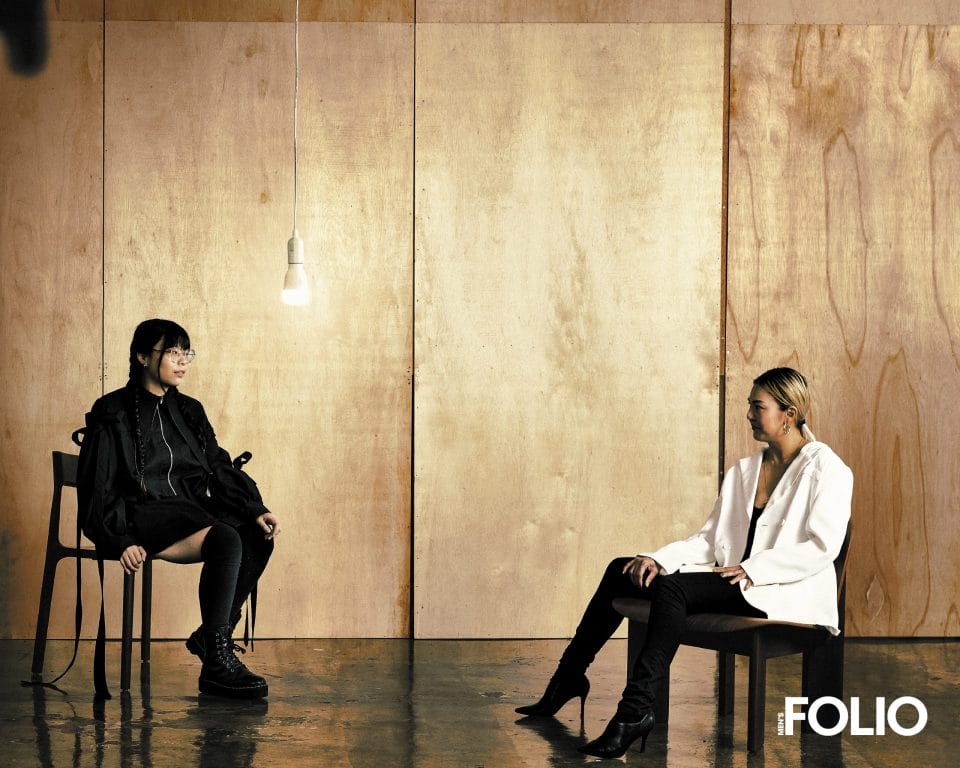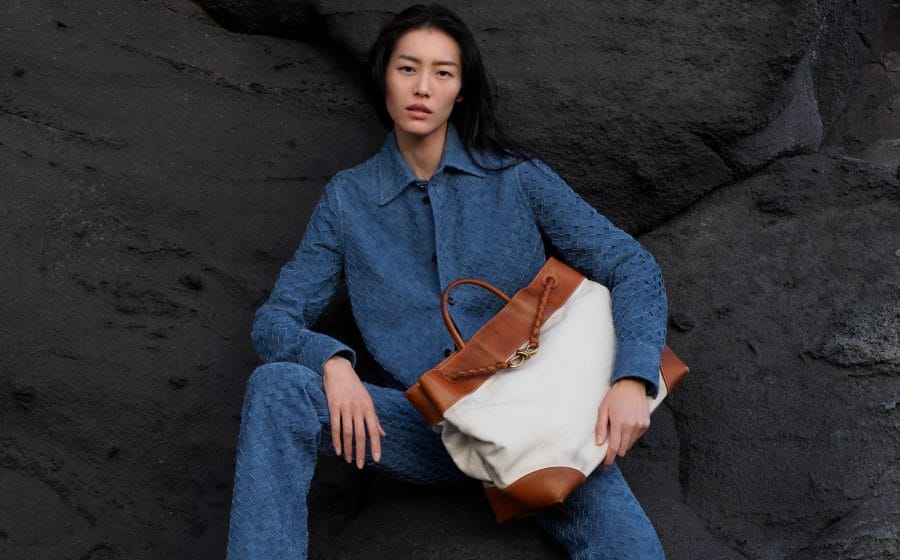
Two models, two photographers and two brand owners join a teacher and a student, and a stylist and her assistant in an exchange of beliefs on their roles in the fashion industry.
Pictured above left to right: Sherry Ho, Apparel Design and Merchandising student at Temasek Polytechnic, Kathryn Shannon Sim, LASALLE College of the Arts programme leader, BA Honours Fashion Media and Industries Programme, and PHD student at London College of Fashion
(On Sherry) All clothing Sherry’s own; (On Shannon) All clothing Shannon’s own; Nau Molloy chair, HAY Chisel lounge chair, all Cult Design Asia
Is the future generation idealistic?
Shannon: I would think that the Gen Z have their own views, have their own voice, and want their voice to be heard. Which is why I love Gen Z. So I would say that I feel that they have to have this idealism — but it is not a bad thing. I see idealism as a positive in the context of fashion. It’s what we need in the fashion industry. Idealism is magical, and at the same time, it’s a commitment, because then you’re committed to manifest this idealism into many forms, like the ideals of like sustainability and inclusivity, which are things they care about. It is needed, you know, to fuel and to bring about change and innovation. And that is the only way to push the fashion industry forward, because you need that sort of thinking, to disrupt, to innovate, to speculate, to provoke, to advocate, you know, anything that you guys stand for, believe in. And I think fashion as the medium is a very powerful medium to bring about change. Do you think you resonate with what I believe?
Sherry: Yeah I think so, I think fashion can make a statement. Especially when you look at, say, sustainability. I mean we are kind of the problem. The place to start would be with us.
Shannon: Yeah! And the fashion industry requires fresh ideas like this. It’s this kind of mindset that would really be able to bring about change and transform the fashion industry. The only change comes from you guys, because you guys are the future generations, whether we’re talking about Gen Z or Gen Alpha, or Gen whatever’s to come.
Sherry: On the point of sustainability, sometimes there’s a lot of it required in every single [school] project, like it’s almost compulsory to be sustainable. And a lot of my classmates are a bit fed up with it, and they’d rather incorporate other issues they care about into their themes and their work. For idealism, in terms of like job prospects, actually a lot of like my classmates don’t want to continue in fashion after this, even though they haven’t stepped into the industry. But, when they come in, they’re hopeful. I do feel like some people try [to start their career in fashion], but it’s based on a surface level whim. You don’t really know what they’re getting into before they join. But I guess that’s also part of like, exploring, and that’s part of growing, and that will help you to make more informed decisions. So I don’t think that’s necessarily a bad thing. But I do think that there is a lot of idealism, but the young will always have idealism. But if you’re in fashion, I feel like you really need to have the passion, because it’s a lot of work, and maybe not so much what we expected in the beginning.
Shannon: I think I want to also add that, you know, it is important to balance out idealism with a realistic and in-depth understanding of the challenges that happen within the industry and of course, the hard work that needs to be put in.
Sherry: I think my generation is more realistic about it, especially after doing their internships. I did a merchandising internship at Club21. And like most of my colleagues were from my fashion design course, but most of them are no longer pursuing that. So maybe by the time they graduate, they understand the industry and challenges a bit more? And like me, some of my friends still want to try it out. Which is good because you never know. And even if you fail, at least you try.
Shannon: Well, you’re more of a maker right? Rather than like a fashion communicator?
Sherry: Yeah. I think design is a bit different from like media, which seems to me more viable?
Shannon: It depends on how you see it. Because for the media and communication side, there’s always options to explore editorial, go into PR, you know, marketing, or even becoming buyers or visual merchandisers. And it’s not to say that the fashion designers or makers don’t have this option. But idealism can generally kick in and become a driver to make you question things, like, ‘hey, why is this done this way?’ and to say ‘no, maybe we can do it this way’. Like what I said, it is a fuel to bring about, to distract, to innovate. But I think [a fashion education] has very strong support systems in place to support students to pursue, as cliché as it sounds, dreams. To pursue this as a career, or to enter into the industry and take on different kinds of roles. And I think if you look at the fashion industry, it is always evolving, always changing, and rapidly with digital transformation. And with the change comes the need for minds full of fresh ideas and solutions, innovators. So there will always be the growing room for Gen Z to come in to seize the opportunities. Do you believe that there is space for you as a designer, or as a fashion creative in Singapore?
Sherry: Singapore might be a bit hard. I’m not saying that my style is very good, or anything like that. But it’s not really what Singaporeans would wear. I mean, I’m sure there are people who would, but I have seen younger brands come up with more unique stuff. I don’t know, I’ve also not tried to sell so I can’t say for sure. Even when we do a collection for school, it’s always more conceptual than you develop and than you do. And it’s often like really avant-garde. So there’s a question like on, whether it could sell?
Is it worth it?
Sherry: I mean I think I would be dissatisfied if I’d have to work for someone else in the future and compromise my own vision. Maybe it’s my ego, or maybe I have high standards for myself. And so I definitely have doubts on the feasibility of fashion. But I think it’s worth it for me. Even if I were to fail, at least I would have tried. And sometimes, I have the belief that I can.
Shannon: I think the thing is, if you never try, you never know. You have to try. The fashion industry can be cruel and it may not be for everybody. But it’s about the other side of the creation, beyond the trade-offs. It may not be for everybody, but to be able to speak for what you believe in and knowing on some level you can make a difference, is, like you said, fulfilling. And at the end of the day, the resilience from being in here is a transferable skill set — I think ultimately, hard work, drive and passion will get people places. And then there will always be room for people like that. As long as you have that confidence to present what you believe in, you will always have a place to come forward and convince. After all, it is a constant conversation or dialogue. And there will always people to be by your side and cheer you on.
Photography Beng
Styling Manfred Lu
Text & Coordination Vanessa Grace Ng
Grooming & Hair Jenny Tan | Paletteinc. using M.A.C. Cosmetics and KEUNE Haircosmetics
Photography Assistant Alfred Phang
Styling Assistant & Production Coordination Lance Aeron
Once you’re done with this story, click here to catch up with our November 2023 issue.







